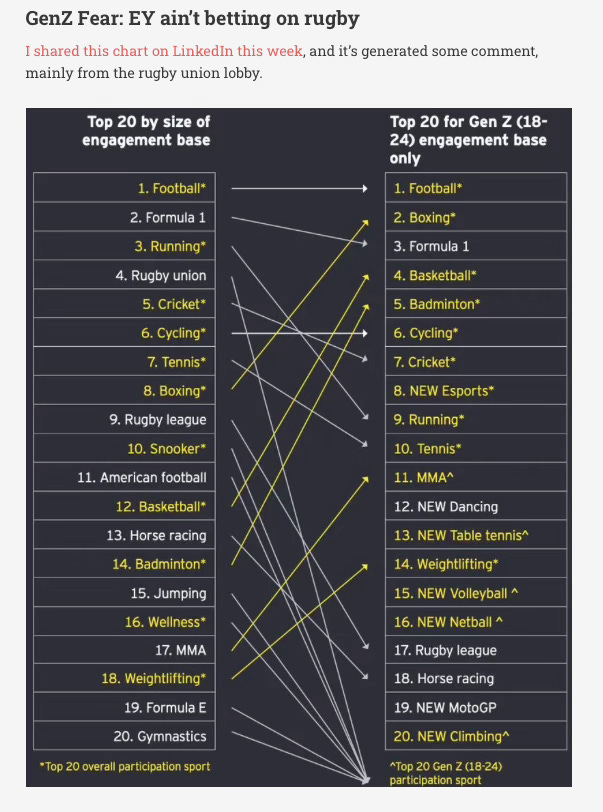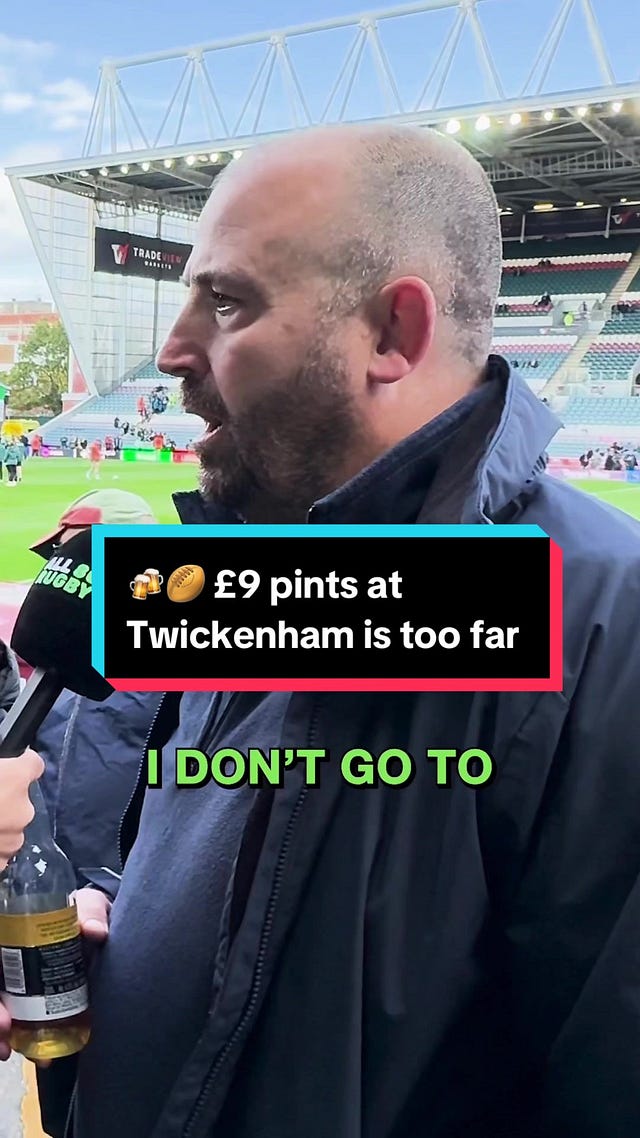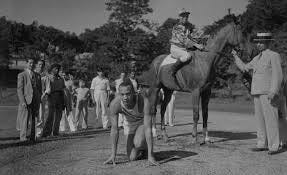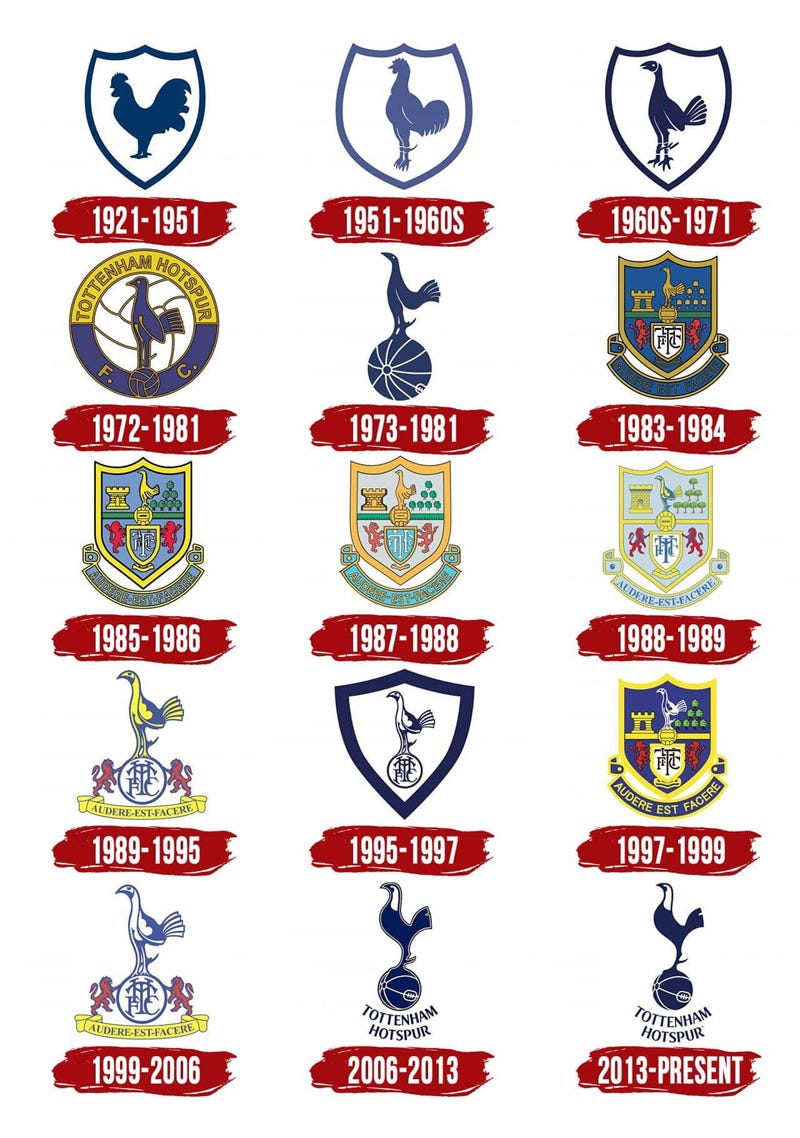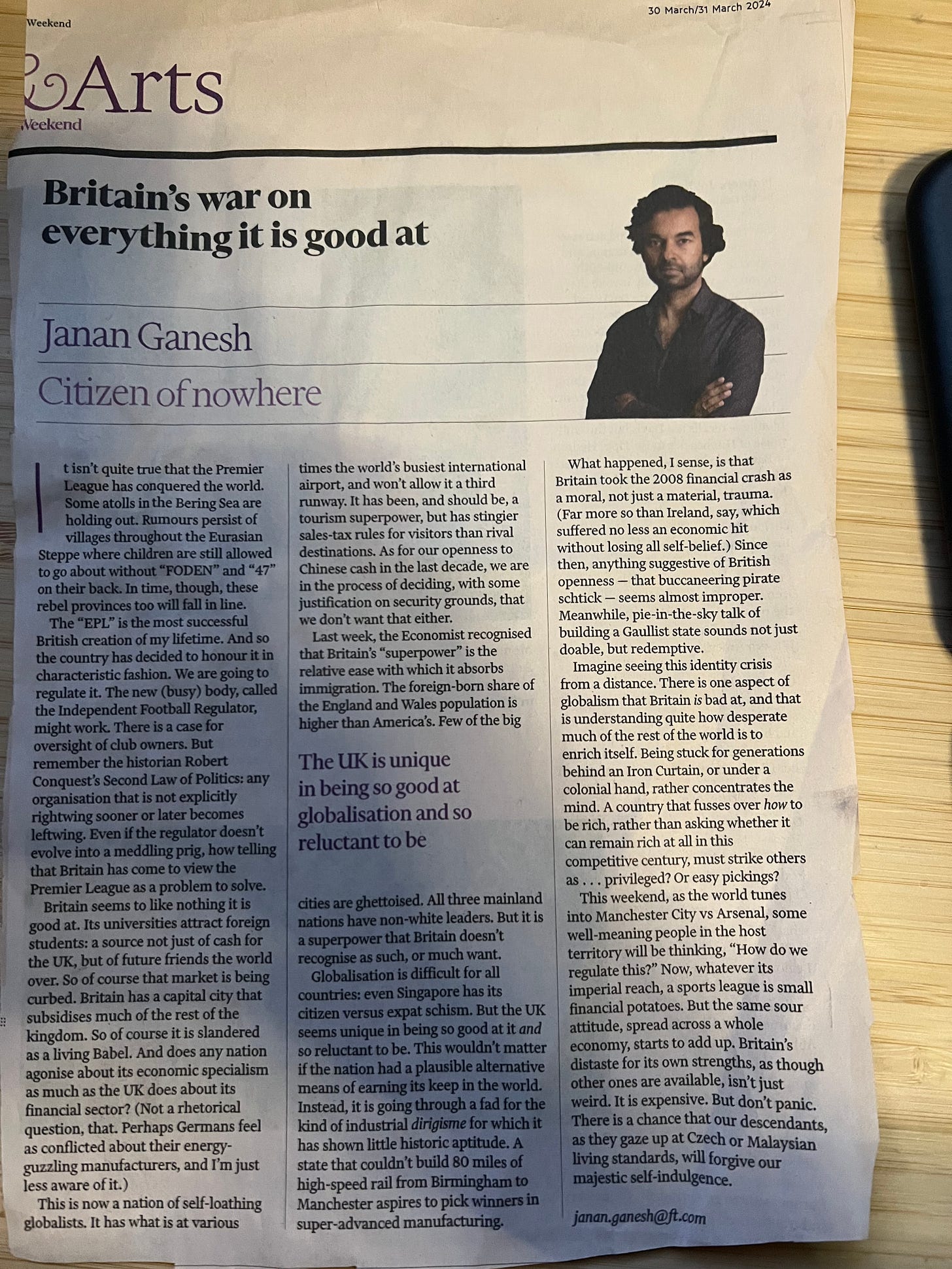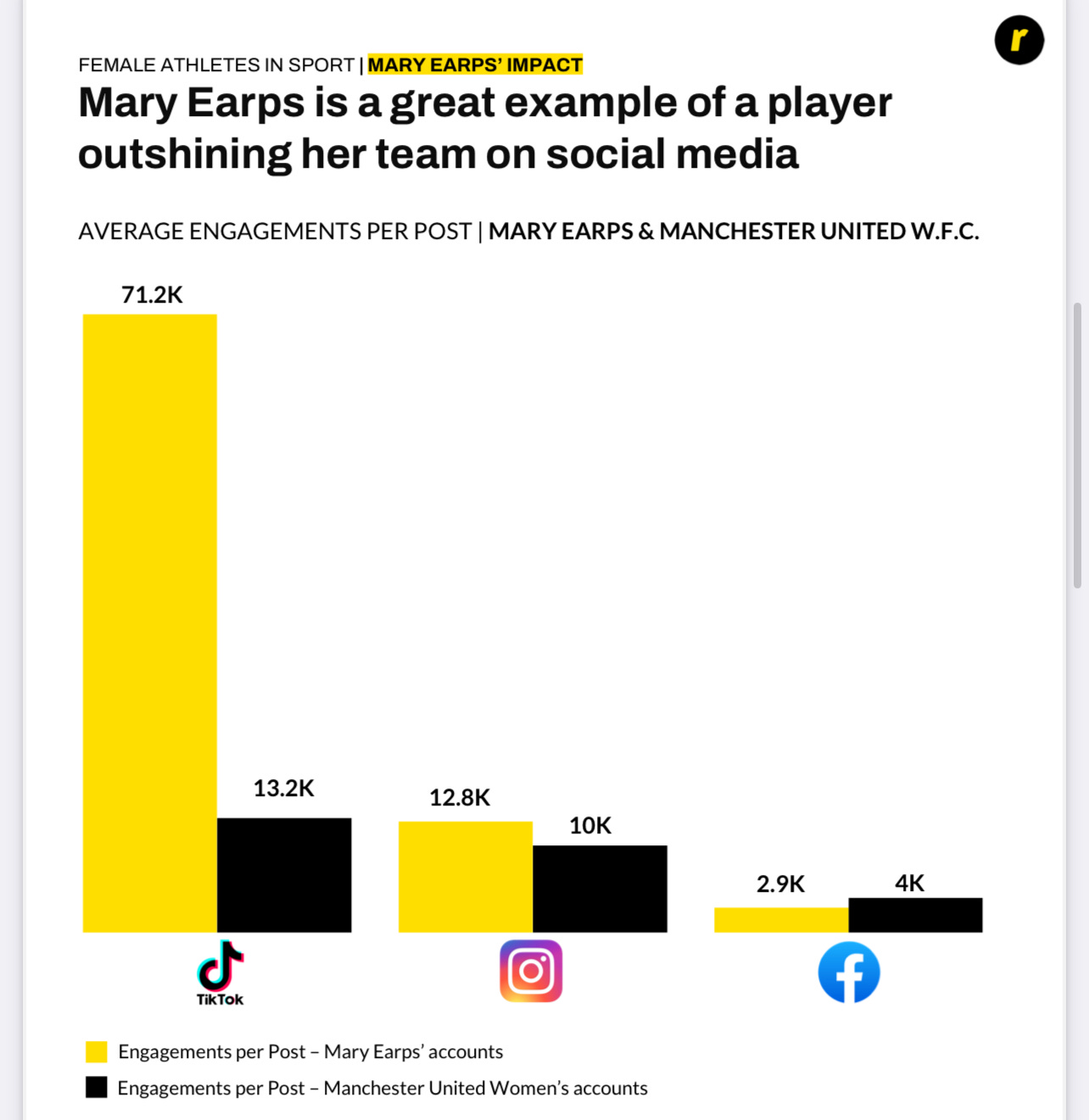Verb - To Netflixify; The disruptive impulse; Unignorable Market Signals; 'Ow much?; Benidorm>Cheltenham; Earps> Man United; Spurs>Jaguar; XG Goes Live; Unilever, women and Saudi; Anti-new bias
Overthinking the sports business, for money
This newsletter is sponsored by Redtorch, a research & creative agency that’s been at the heart of sport and fitness for over 20 years.
We all know the value of research that produces usable insights and creative that’s actually effective. But with so many agencies to choose from, how are we supposed to know which is the right one for us?
Redtorch makes the choice easy.
Independent, friendly and highly qualified, they’re trusted and retained by many of the world’s biggest sports and fitness organisations because they offer everything you’d expect from a specialist agency: unmatched flexibility, the best people, a constant stream of innovative ideas.
Visit www.redtorch.sport to learn more.
Best not to ignore the disruptive impulse
The rugby and sports news press spent the week hating on the idea of a rebel series.
See previous: Rugby 12s in 8 Gifs
Let’s leave the actual proposal to one side and talk about something related, that has a more universal application, which is the sports media’s prejudice against innovation more generally.
It is an easy position to take, safe in the knowledge that they represent the views of the fan against The Man, which starts from the perspective that business is bad and the people selling it are not to be trusted, despite many of said journalists being among the key beneficiaries of the investment.
Cricket writers hated Twenty20 until they didn’t. Football writers shat all over the Premier League, which subsequently kept them in work. And so on.
Every major sports format or event innovation faces the same challenge - to survive long enough to get beyond the first wave of indifference and ridicule.
LIV Golf is in an interesting spot in this regard. Will it make it to the other side or be broken up as collateral damage in the cause of Saudi/PIF’s greater strategic imperatives?
Likewise, FIFA’s comms team will spend much of the next six months doggedly pushing the FIFA Club World Cup in the hope of a turn in attitudes.
From a comms point of view, the response of the sports media can be priced in and even re-presented as a proof of concept for the new thing, positioning the sports media as part of the problem, blind to the future: Blockbuster customers circa 2006. Faster horses and all that.
One final point on Disruption Comms: if I led an incumbent sports governing body, I’d plant stories of an American funded breakaway franchise super league seeking to overthrow the traditional game. Real barbarians at the gate stuff.
Nothing generates more love for the boring old status quo than the rumour of a breakaway.
Right in the diagnosis, wrong on the solution
As mentioned previously, rugby has a number of significant problems. This following chart, previously shared, shows rugby union falling from 4th place to nowhere. It will definitely have appeared on the Rebel Powerpoint at some stage.
I’ve no idea if a Sport by McKinsey IPL for Rugby is the answer. But that doesn’t mean the question it’s asking is wrong.
Revolutionaries are never any good at the job of government. Their solutions tend to be immature; a sixth form debating view of the world, full of slogans and posturing, while ignoring the boring but essential compromises that make up the job of running a professional sport.
That said…it would be daft to ignore the impulse.
This piece is relevant in that regard.
The system may indeed be broken and dysfunctional and have abandoned the national interest. That’s why disrupters and populists have come to power. They are often right in their diagnosis of what has gone wrong. But their objective in busting the system wide open can open the way to charlatanry, demagoguery and chaos. Revolutions, after all, never end well.
Rugby fans go in search of the Autumn Internationals
The reasons for the unrest are in plain sight.
As mentioned previously, sport is selling cost and confusion to customers who crave simplicity.
Un-ignorable Market Signals: Wealthy people moaning about ticket prices
This will look quaint in a few years time, when a pint is £20 and the stadium is still full.
See also:
Benidorm > Cheltenham
Two punters take an alternative route:
‘We’ve paid £270 for a hotel and flights to sit in sunshine and watch the festival with £2 pints, the value isn’t there anymore’.
This comment is a nice counter, what is it we’re buying when we buy a ticket?
What if, Jake Paul is the TOP of the market?
Scary thought. But that’s what Netflix thinks last weekend’s Tyson running against horses stunt was.
“Netflix plans to "Netflixify" any sports they do get involved in, investing heavily in storytelling and unique productions”.
This was Greg Peters at the FT Live event.
Note how he frames Netflix against Amazon.
“Amazon came into the market in a pretty strong way,” Peters said with a smile. “My general sense is that they are an advertising company. This is a core part of their DNA. So their angle was, it’s advertising, and then you have this option to sort of buy out of it if you want, but really, it’s advertising first. And very much like Amazon does, they sort of came at it and said — what’s their mantra, ‘your margin is my opportunity’ — they came in and said, we are going to go drop to the bottom, essentially, and start to compete from that basis. And that’s their playbook.”
Peters is saying Netflix are premium, Amazon the discounter. But it’s more than that. He’s pushing Netflix as the creatives and Amazon as the suits, merely ‘an advertising company’.
So, Jake Paul v Mike Tyson is premium storytelling that reimagines boxing for a new audience, rather than say, a gawdy, greedy stunt.
Btw, always worry when a company attempts to turn itself in to a verb. It rarely ends well. It’s like when people talk about themselves in the third person (Ileism).
Vb: To Netflixify
Meaning: To take your favourite sport and make it slightly more shit in order to appeal to people who don’t like sport and who you would pay money to avoid meeting IRL.
See also: Dan Rayburn on the misconceptions around the Paul v Tyson is excellent.
For those making up numbers and publishing them without sources, and you have the title of "Research Director" or "Analyst," shame on you. Playing fast and loose with numbers is not acceptable.
Spurs > Jaguar
Two great British brands were given a re-up this week.
One is the epitome of timeless style, elegance and class. The other is Jaguar (woof).
Branding consultants are the last group left in society whom it’s acceptable to mock; damned if they do, damned if they don’t.
The Jaguar rebrand has become a meme.
Whereas the new Spurs logo re-do was criticised for being too subtle.
(Btw, absolutely love Spurs fans):
Mark Ritson raised a couple of points on Jaguar, which I think have a sport biz relevance.
Nostalgia: “Your heritage is a 90-year old competitive advantage. You walk away from it at your peril”.
Britishness: “We should underline Britishness too. In all the talk of Miami Art Shows and Paris boutiques, the team should have reasserted that Jaguar is a very British brand. I say that not to be jingoistic, but commercial. The paradox of being global is that you need to push your British origins to get there. I have several car-loving German friends who begrudgingly admit that a great British car is something they long for more than any other. There is a certain slice of the American car-buying populace that hankers for a British-made vehicle. I know, and you know, that this does not make any sense. But it’s a market truth. And it is a massive opportunity for Jaguar.
But among all the marketing arse that Jaguar has “curated” about modernism and creativity, how about something about being British? Not clichéd, plastic-flag, fish-and-chips British. Proper British. Stella McCartney, Jude Bellingham, Ed Sheeran British. It’s what they want out there beyond these shores, so why not sell it to them in automotive form?
I think we need to do an episode of The Big Idea on sport’s relationship with Britishness. It’s a delicate topic in these post-Brexit days, but relevant to a market which is chasing the global fan.
This is great, from the FT earlier in the year:
Unilever said No to FIFA Club World Cup
Unilever has doubled down on sports marketing.
So a good time to be talking with Willem Dinger, the company’s global lead on sport and entertainment partnerships, for The Buy Side this week.
I asked whether the company’s women-focused brand purpose driven activations are compatible with FIFA’s Saudi relationship.
One snippet that we’ll return to: Dinger said that Unilever has declined to sponsor the FIFA Club World Cup.
Earps > Man United
The following opinion is nicked from Maggie Murphy and Matt Cutler’s conversation on Mary Earps social strategy, in this week’s brilliant Expected Goals - there’s a link to the podcast below.
What happened?
Earps has made it to Madame Tussauds. [INSERT PHRASE ‘CULTURAL RELEVANCE’ HERE]
Maggie Murphy quoted Relo Metrics report on Earps social media data.
“She, as an individual, over the 23-24 season, she had 71,000 engagements per post on TikTok. And if you compare that to Manchester United Women's team, their TikTok, it was only 13,000”.
From Expected Goals: Will women's football suffer from a Twitter exodus?
Expected Goals Goes Live
The first live event happened at Edgbaston last night. It was a football cricket crossover at the launch of the launch party for the Birmingham Bears women’s team.




